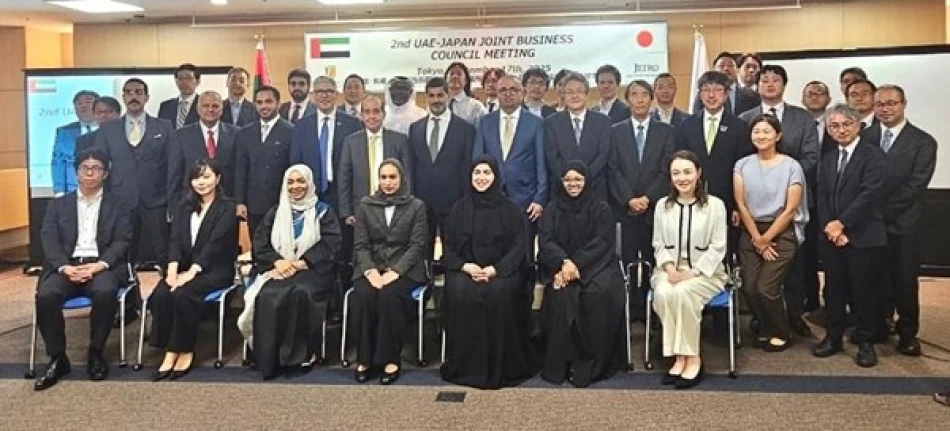
UAE-Japan Business Council's Second Meeting Draws 40 Stakeholders for Bilateral Trade Talks
UAE and Japan Deepen Business Ties as Private Sector Takes Center Stage in Economic Partnership
The second UAE-Japan Joint Business Council meeting in Tokyo signals a strategic shift toward private sector-led economic cooperation between the two nations, with over 40 companies exploring partnerships across emerging sectors from circular economy to sustainable energy. This business-first approach reflects both countries' recognition that future economic growth will depend less on traditional government-to-government deals and more on dynamic private enterprise collaboration.
Beyond Traditional Trade: New Sectors Drive Partnership
The Tokyo meeting, organized by the UAE Federation of Chambers of Commerce alongside Japan's JETRO organization, brought together representatives from manufacturing, renewable energy, real estate, healthcare, IT, and agriculture sectors. What's particularly noteworthy is the expansion into non-traditional areas like circular economy solutions and entertainment—sectors that didn't feature prominently in earlier UAE-Japan economic discussions.
This diversification mirrors successful economic partnership models seen between the UAE and Singapore, where initial energy-focused cooperation evolved into fintech, logistics, and innovation hubs. Japan's renowned manufacturing expertise combined with the UAE's position as a regional business gateway creates natural synergies, especially as both nations pivot toward sustainability-focused economies.
Strategic Timing Amid Global Economic Shifts
The meeting's emphasis on clean energy cooperation comes at a crucial moment. Japan continues seeking energy security alternatives following its nuclear power challenges, while the UAE positions itself as a renewable energy leader ahead of COP28 hosting duties. This alignment of national priorities with private sector capabilities suggests more substantial deals ahead than typical diplomatic trade missions produce.
Women in Business: A Competitive Advantage
The prominent role of UAE businesswomen in the delegation, led by Aisha Mohammed Al Mulla of the UAE Businesswomen Council, highlights a strategic advantage. The UAE's 70% female workforce participation in government sectors and growing female entrepreneurship rates contrast favorably with Japan's ongoing struggles with workplace gender equality. This could position UAE companies as attractive partners for Japanese firms seeking to demonstrate corporate social responsibility improvements.
Market Implications and Investment Outlook
For investors, this deepening partnership represents several opportunities. Japanese companies gain enhanced access to Middle Eastern and African markets through UAE's established trade corridors, while Emirati firms can leverage Japan's advanced manufacturing technologies and quality reputation.
The focus on sustainable energy solutions particularly benefits both nations' sovereign wealth funds and private equity sectors, which have been actively seeking ESG-compliant investments. Japan's $1.7 trillion Government Pension Investment Fund and the UAE's various sovereign funds could find substantial co-investment opportunities in the clean technology space.
Competitive Positioning Against Regional Rivals
This UAE-Japan collaboration also serves strategic competitive purposes. As Saudi Arabia aggressively courts Asian investment through its Vision 2030 program, the UAE maintains its traditional advantage through established business relationships and regulatory frameworks that Japanese companies find more familiar and reliable.
Similarly, as China's Belt and Road Initiative faces increasing skepticism from Japanese businesses, the UAE offers an alternative pathway for Japanese companies seeking Middle Eastern market access without the geopolitical complications of Chinese partnerships.
What Success Looks Like
The real test of this partnership will be measurable outcomes over the next 12-18 months. Unlike previous business councils that produced memorandums of understanding with limited follow-through, the current focus on specific sectors with identified private sector champions suggests more concrete results ahead. Watch for joint venture announcements in renewable energy infrastructure, healthcare technology partnerships, and potentially significant real estate development projects that combine Japanese engineering expertise with UAE market knowledge.
Most Viewed News

 Layla Al Mansoori
Layla Al Mansoori






